Over 30 years of anarchist writing from Ireland listed under hundreds of topics
Austerity is working - for the rich!
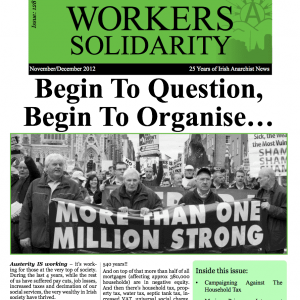 Austerity IS working – it’s working for those at the very top of society. During the last 4 years, while the rest of us have suffered pay cuts, job losses, increased taxes and decimation of our social services, the very wealthy in Irish society have thrived.
Austerity IS working – it’s working for those at the very top of society. During the last 4 years, while the rest of us have suffered pay cuts, job losses, increased taxes and decimation of our social services, the very wealthy in Irish society have thrived.
Pat Funicane murder - British state sweeps the dirt under the carpet
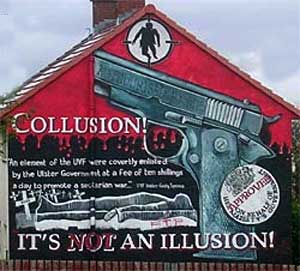 The publishing of the De Silva’s report into the murder of Pat Funicane may have exposed a bit of dirt from under the carpet of the British states secret war in Ireland but the scars and flames of the past have not gone away - they continue to shape policing in the 21st century. As Geraldine Finucane articulated, ’’The dirt has been swept under the carpet without any serious attempt to lift the lid on what really happened to Pat and so many others.’’
The publishing of the De Silva’s report into the murder of Pat Funicane may have exposed a bit of dirt from under the carpet of the British states secret war in Ireland but the scars and flames of the past have not gone away - they continue to shape policing in the 21st century. As Geraldine Finucane articulated, ’’The dirt has been swept under the carpet without any serious attempt to lift the lid on what really happened to Pat and so many others.’’
Pat Finucane murder & the cover up of Britain's dirty war in Ireland
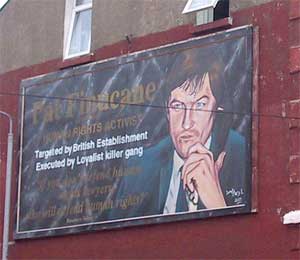 Pat Finucane was murdered in front of his wife and children in Belfast in February 1989. Because a British MP and junior minister Douglas Hogg had suggested in Westminister days earlier that particular solicitors were "unduly sympathetic to the IRA" and because of a longstanding belief by many that there was active collusion between the State and loyalist paramilitaries, questions immediately started to be asked. The report on Wednesday of the De Silva commission into the murder was the latest attempt by the highest levels of the British state to absolve themselves of any responsibility or guilt into what is often refered to as the 'Dirty War' waged in Ireland during the whole period of the troubles. A similar effort was made with the report of the Bloody Sunday tribunal, both reports sought to ring fence responsibility to rogue elements or as minor players as possible within the state apparatus. The reason for this is an attempt to protect the integrity of the state and it's security services.
Pat Finucane was murdered in front of his wife and children in Belfast in February 1989. Because a British MP and junior minister Douglas Hogg had suggested in Westminister days earlier that particular solicitors were "unduly sympathetic to the IRA" and because of a longstanding belief by many that there was active collusion between the State and loyalist paramilitaries, questions immediately started to be asked. The report on Wednesday of the De Silva commission into the murder was the latest attempt by the highest levels of the British state to absolve themselves of any responsibility or guilt into what is often refered to as the 'Dirty War' waged in Ireland during the whole period of the troubles. A similar effort was made with the report of the Bloody Sunday tribunal, both reports sought to ring fence responsibility to rogue elements or as minor players as possible within the state apparatus. The reason for this is an attempt to protect the integrity of the state and it's security services.
'It's My Choice' public meeting in Cork
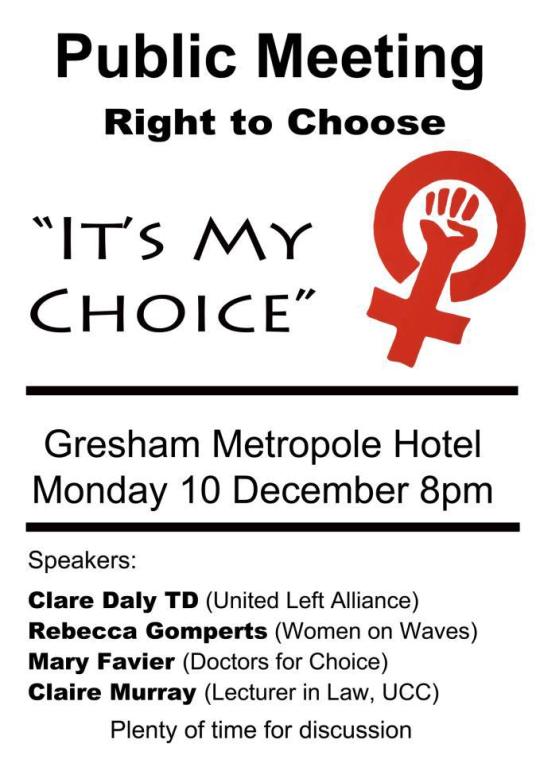 Monday night saw a packed attendance for the 'It's My Choice' meeting in the Metropole Hotel, Cork City. The meeting, billed as an explicitly pro-choice public event, featured three speakers, United Left Alliance TD, Clare Daly, UCC Law lecturer, Claire Murray, and Dr. Mary Favier of Doctors for Choice. Unfortunately, a fourth speaker, Rebecca Gomperts, an activist with the Women on Waves organisation, was unable to attend
Monday night saw a packed attendance for the 'It's My Choice' meeting in the Metropole Hotel, Cork City. The meeting, billed as an explicitly pro-choice public event, featured three speakers, United Left Alliance TD, Clare Daly, UCC Law lecturer, Claire Murray, and Dr. Mary Favier of Doctors for Choice. Unfortunately, a fourth speaker, Rebecca Gomperts, an activist with the Women on Waves organisation, was unable to attend
Irish Anarchist Review 6 - Winter 2012
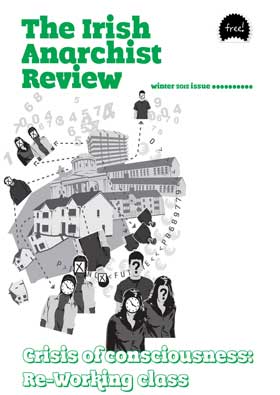 Welcome to the sixth instalment of the Irish Anarchist Review, produced by the Workers Solidarity Movement. In this magazine we look to explore ideas about the world around us, how these ideas inform practice and how the intersection of the two leads to new theory, beginning the process afresh. We believe that ideas can only be tested in the laboratory of real life struggle and that this magazine can be a forum for activists who are part of the daily struggle that is going on right now. We hope that the articles here can stimulate discussion and debate and perhaps even motivate some of our readers to respond with articles of their own.
Welcome to the sixth instalment of the Irish Anarchist Review, produced by the Workers Solidarity Movement. In this magazine we look to explore ideas about the world around us, how these ideas inform practice and how the intersection of the two leads to new theory, beginning the process afresh. We believe that ideas can only be tested in the laboratory of real life struggle and that this magazine can be a forum for activists who are part of the daily struggle that is going on right now. We hope that the articles here can stimulate discussion and debate and perhaps even motivate some of our readers to respond with articles of their own.
Brave New North: Neoliberalism in the Six Counties
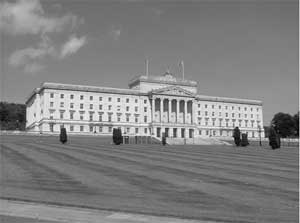 Guest writer Liam O’Rourke casts his eye over the neo-liberal project of regeneration in the six counties. He notes that the elite sections of both communities have no problem uniting around what he describes as the “shared non-sectarian identity of the consumer” which reduces shared space to “commercial shared space”. Yet the fact that working class people have seen little of the promised “peace dividend” has not lead to heightened class consciousness so much as it has to increased sectarian division.
Guest writer Liam O’Rourke casts his eye over the neo-liberal project of regeneration in the six counties. He notes that the elite sections of both communities have no problem uniting around what he describes as the “shared non-sectarian identity of the consumer” which reduces shared space to “commercial shared space”. Yet the fact that working class people have seen little of the promised “peace dividend” has not lead to heightened class consciousness so much as it has to increased sectarian division.
Chavs: The Demonization of the Working Class by Owen Jones
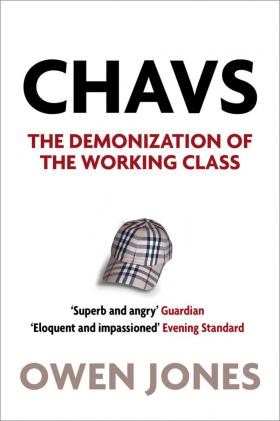 Released in Summer 2011 and now in its second edition, Chavs is Owen Jones' attempt to help rescussitate debate around class within mainstream outdated concept and political discourse.
Released in Summer 2011 and now in its second edition, Chavs is Owen Jones' attempt to help rescussitate debate around class within mainstream outdated concept and political discourse.
Broadly speaking, it is focused on the fate of working class communities in Britain since the Thatcher era and the disappearance of working class political representation, and puts forward some possible ideas to envision a renewed class politics for today. The book has proven a popular one and has propelled its author's public status as a prominent left-wing commentator, and one of the main voices of initiatives to reclaim the Labour Party as a working class organisation.
Anarchist Studies Network Conference 2: 'Making Connections''
It’s a strange anomaly that anarchism is so marginal an idea in academia despite it being a major influence on contemporary social movement praxis, as well as having been the dominant proletarian ideology worldwide for decades leading up to the Russian Revolution.
Marx’s Economics for Anarchists by Wayne Price
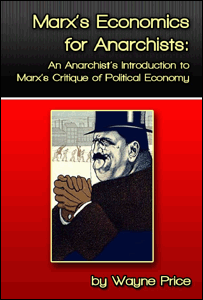 One of the chapters in Wayne Price’s invaluable book is entitled ‘The Capitalist Epoch of Decline’ and it is hard to imagine that we are living in anything else. All of capitalism’s men are rushing around attempting to get the wheels back on the cart that is taking us ever-faster to hell. For many people at this stage it has become obvious that putting the wheels back on does nothing for the ultimate destination.
One of the chapters in Wayne Price’s invaluable book is entitled ‘The Capitalist Epoch of Decline’ and it is hard to imagine that we are living in anything else. All of capitalism’s men are rushing around attempting to get the wheels back on the cart that is taking us ever-faster to hell. For many people at this stage it has become obvious that putting the wheels back on does nothing for the ultimate destination.
Review Mentioning the War: Essays and Reviews 1999-2011 by Kevin Higgins
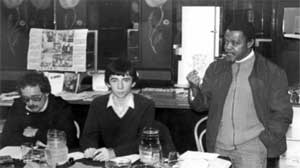 Kevin Higgins is a poet from Galway and a long-standing contributor to the independent left publication Red Banner Magazine. A former member of the Militant Tendency (now the Socialist Party), he has played no small part in making the world of writing a more accessible and pleasant place to be in this country – not least for those who don’t normally find themselves welcome in the hallowed, middle class halls of Literativille.
Kevin Higgins is a poet from Galway and a long-standing contributor to the independent left publication Red Banner Magazine. A former member of the Militant Tendency (now the Socialist Party), he has played no small part in making the world of writing a more accessible and pleasant place to be in this country – not least for those who don’t normally find themselves welcome in the hallowed, middle class halls of Literativille.

